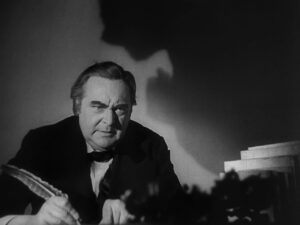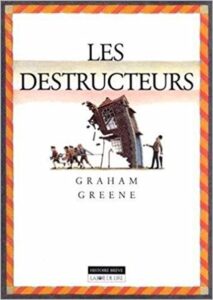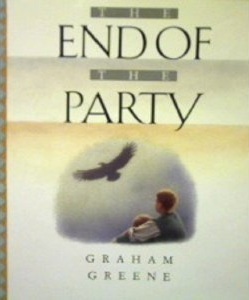The Chaser short story with PDF – John Collier

“The Chaser” is a short story which is authored by renowned American author John Collier. The chaser is a gripping and thought-provoking short story that delves deep into the labyrinth of human desires and the consequences that accompany their fulfillment. This captivating tale takes readers on a journey that explores the dark corners of love, morality, and the intricate web spun by our deepest yearnings. In this article, we embark on an exploration of the profound themes, compelling character dynamics, and lingering impact of “The Chaser.”
“The Chaser” short story follows the plight of Alan Austen, a young man yearning for the affection of a woman named Diana. In his desperate pursuit, he turns to a mysterious and shrewd old man known as the Chaser, whose potions promise to fulfill any desire. As the story unfolds, readers are led through a labyrinth of moral ambiguity, raising thought-provoking questions about the nature of love, the boundaries of manipulation, and the price one is willing to pay for their desires.
At its core, “The Chaser” short story grapples with the dichotomy between love and obsession, exploring the ethical dilemmas that arise when individuals attempt to control and manipulate the emotions of others. Through the complex character dynamics between Alan and the Chaser, the story delves into the psychological intricacies of human desires and the unforeseen consequences that befall those who seek shortcuts to their dreams.
You can download a free PDF copy of The Chaser short story right below. This story is included into the high school curriculum of the USA and is read by hundreds of thousands of children across the world.
Other stories of this genre which you might be interested in are “The Birthmark or “The little match girl“”
Table of contents – The Chaser short story
- About the author
- The Chaser short story
- Plot, Summary and Analysis – The Chaser
- The Chaser short story –PDF
About the author – John Collier
John Collier was an English-born author known for his captivating and thought-provoking works of fiction. Born on May 3, 1901, in London, Collier’s literary career spanned several decades, leaving a lasting impact on the field of speculative fiction and dark fantasy. His writing often delved into themes of morality, the human psyche, and the complexities of relationships.
Collier’s unique storytelling style combined elements of fantasy, satire, and the macabre, earning him a reputation as a master of the short story form. His works were characterized by their intricate plots, rich characterizations, and unexpected twists that challenged conventional norms and pushed the boundaries of imagination.
Collier’s best-known stories include “The Chaser”, “Evening Primrose,” and “Thus I Refute Beelzy,” which showcase his ability to explore the depths of human desires, the consequences of unethical actions, and the complexities of love and relationships. His writing often presented social commentary and psychological insights, encouraging readers to reflect on the darker aspects of human nature.
John Collier’s contributions to literature continue to resonate with readers, and his unique storytelling voice has left an indelible mark on the genre. His works remain highly regarded for their imaginative concepts, sharp wit, and timeless themes that explore the intricacies of the human condition.
The Chaser short story
Alan Austen, as nervous as a kitten, went up certain dark and creaky stairs in the neighborhood of Pell Street, and peered about for a long time on the dime landing before he found the name he wanted written obscurely on one of the doors.
He pushed open this door, as he had been told to do, and found himself in a tiny room, which contained no furniture but a plain kitchen table, a rocking-chair, and an ordinary chair. On one of the dirty buff-coloured walls were a couple of shelves, containing in all perhaps a dozen bottles and jars. An old man sat in the rocking-chair, reading a newspaper. Alan, without a word, handed him the card he had been given.
“Sit down, Mr. Austen,” said the old man very politely.
“I am glad to make your acquaintance.”
“Is it true,” asked Alan, “that you have a certain mixture that has-er-quite extraordinary effects?”
“My dear sir,” replied the old man, “my stock in trade is not very large-I don’t deal in laxatives and teething mixtures-but such as it is, it is varied. I think nothing I sell has effects which could be precisely described as ordinary.”
“Well, the fact is. . .” began Alan.
“Here, for example,” interrupted the old man, reaching for a bottle from the shelf. “Here is a liquid as colourless as water, almost tasteless, quite imperceptible in coffee, wine, or any other beverage. It is also quite imperceptible to any known method of autopsy.”
“Do you mean it is a poison?” cried Alan, very much horrified.
“Call it a glove-cleaner if you like,” said the old man indifferently. “Maybe it will clean gloves. I have never tried. One might call it a life-cleaner. Lives need cleaning sometimes.”
“I want nothing of that sort,” said Alan.
“Probably it is just as well,” said the old man. “Do you know the price of this? For one teaspoonful, which is sufficient, I ask five thousand dollars. Never less. Not a penny less.”
“I hope all your mixtures are not as expensive,” said Alan apprehensively.
“Oh dear, no,” said the old man. “It would be no good charging that sort of price for a love potion, for example. Young people who need a love potion very seldom have five thousand dollars. Otherwise they would not need a love potion.”
“I am glad to hear that,” said Alan.
“I look at it like this,” said the old man. “Please a customer with one article, and he will come back when he needs another. Even if it is more costly. He will save up for it, if necessary.”
“So,” said Alan, “you really do sell love potions?”
“If I did not sell love potions,” said the old man, reaching for another bottle, “I should not have mentioned the other matter to you. It is only when one is in a position to oblige that one can afford to be so confidential.”
“And these potions,” said Alan. “They are not just-just-er-”
“Oh, no,” said the old man. “Their effects are permanent, and extend far beyond the mere casual impulse. But they include it. Oh, yes they include it. Bountifully, insistently. Everlastingly.”
“Dear me!” said Alan, attempting a look of scientific detachment. “How very interesting!”
“But consider the spiritual side,” said the old man.
“I do, indeed,” said Alan.
“For indifference,” said the old man, they substitute devotion. For scorn, adoration. Give one tiny measure of this to the young lady-its flavour is imperceptible in orange juice, soup, or cocktails-and however gay and giddy she is, she will change altogether. She will want nothing but solitude and you.”
“I can hardly believe it,” said Alan. “She is so fond of parties.”
“She will not like them any more,” said the old man. “She will be afraid of the pretty girls you may meet.”
“She will actually be jealous?” cried Alan in a rapture. “Of me?”
“Yes, she will want to be everything to you.”
“She is, already. Only she doesn’t care about it.”
“She will, when she has taken this. She will care intensely. You will be her sole interest in life.”
“Wonderful!” cried Alan.
“She will want to know all you do,” said the old man. “All that has happened to you during the day. Every word of it. She will want to know what you are thinking about, why you smile suddenly, why you are looking sad.”
“That is love!” cried Alan.
“Yes,” said the old man. “How carefully she will look after you! She will never allow you to be tired, to sit in a draught, to neglect your food. If you are an hour late, she will be terrified. She will think you are killed, or that some siren has caught you.”
“I can hardly imagine Diana like that!” cried Alan, overwhelmed with joy.
“You will not have to use your imagination,” said the old man. “And, by the way, since there are always sirens, if by any chance you should, later on, slip a little, you need not worry. She will forgive you, in the end. She will be terribly hurt, of course, but she will forgive you-in the end.”
“That will not happen,” said Alan fervently.
“Of course not,” said the old man. “But, if it did, you need not worry. She would never divorce you. Oh, no! And, of course, she will never give you the least, the very least, grounds for-uneasiness.”
“And how much,” said Alan, “is this wonderful mixture?”
“It is not as dear,” said the old man, “as the glove-cleaner, or life-cleaner, as I sometimes call it. No. That is five thousand dollars, never a penny less. One has to be older than you are, to indulge in that sort of thing. One has to save up for it.”
“But the love potion?” said Alan.
“Oh, that,” said the old man, opening the drawer in the kitchen table, and taking out a tiny, rather dirty-looking phial. “That is just a dollar.”
“I can’t tell you how grateful I am,” said Alan, watching him fill it.
“I like to oblige,” said the old man. “Then customers come back, later in life, when they are better off, and want more expensive things. Here you are. You will find it very effective.”
“Thank you again,” said Alan. “Good-bye.”
“Au revoir,” said the man.
Moral of the story
The moral of “The Chaser” is a cautionary tale about the consequences of pursuing desires through manipulative means. It serves as a reminder that true love cannot be forced or controlled, and attempting to do so can lead to dire repercussions. The story emphasizes the importance of ethical behavior, respect for personal autonomy, and the recognition that authentic love cannot be obtained through shortcuts or deceit.
The short story, the chaser, warns against the dangers of obsession and the potential harm that can arise from trying to manipulate the feelings of others. Ultimately, the moral message of “The Chaser” encourages readers to value genuine connections, embrace the complexities of love, and approach relationships with honesty, integrity, and respect for the free will of others.
Summary of The Chaser Short story
Aa young man named Alan Austen seeks the help of a mysterious old man known as the Chaser to win the love of a woman named Diana. The Chaser offers Alan a love potion that guarantees Diana’s affection, but at a steep price.
Despite the Chaser’s warnings, Alan insists on purchasing a different potion to remove the effects of the love potion. The story ends with Alan’s realization that true love cannot be forced or manipulated and that he is trapped in an endless cycle of seeking love through artificial means. The narrative explores themes of love, manipulation, and the moral implications of pursuing desires through unethical methods.
Major themes of The Chaser Short story
The Chaser short story encompasses several major themes that resonate with readers of all ages. These themes include:
- Love and Obsession: The story explores the fine line between love and obsession, highlighting the dangers of becoming fixated on someone and the potential harm that can arise from attempting to manipulate their emotions.
- Morality and Ethics: “The Chaser” raises questions about the moral and ethical implications of pursuing desires through manipulative means. It examines the consequences of disregarding ethical boundaries and the moral quandaries that arise when one seeks to control the feelings of others.
- Consequences of Actions: The story emphasizes the consequences that accompany the choices we make. It suggests that seeking shortcuts or employing unethical methods to achieve our desires can lead to unforeseen and undesirable outcomes.
- True Love and Authentic Connections: “The Chaser” underscores the importance of genuine love and authentic connections. It warns against attempting to force or manipulate affection, reminding readers that true love cannot be bought or artificially induced.
- Manipulation and Control: The narrative explores the dangers of manipulating and controlling others for personal gain. It raises questions about the boundaries of manipulation and the ethical responsibilities we have towards others in matters of love and relationships.
- Price of Desires: The story highlights the concept of the “price” associated with desires. It suggests that fulfilling one’s desires through manipulative means often comes at a steep cost, be it moral, emotional, or psychological.
These themes collectively serve to caution readers about the potential consequences of unethical actions and the importance of valuing true love, ethical behavior, and genuine connections in relationships.
The Chaser – Short story – PDF
The Beauty and the Beast is an enchanting tale that has transcended time and captured the hearts of readers for generations. Its was once part of an old traditional fairy tale, but the version penned by French novelist Gabrielle-Suzanne Barbot de Villeneuve in 1740 has become the most popular short story. You can download a free PDF copy of The Beauty and the Beast short story right below and also download a worksheet with many questions and answers.



